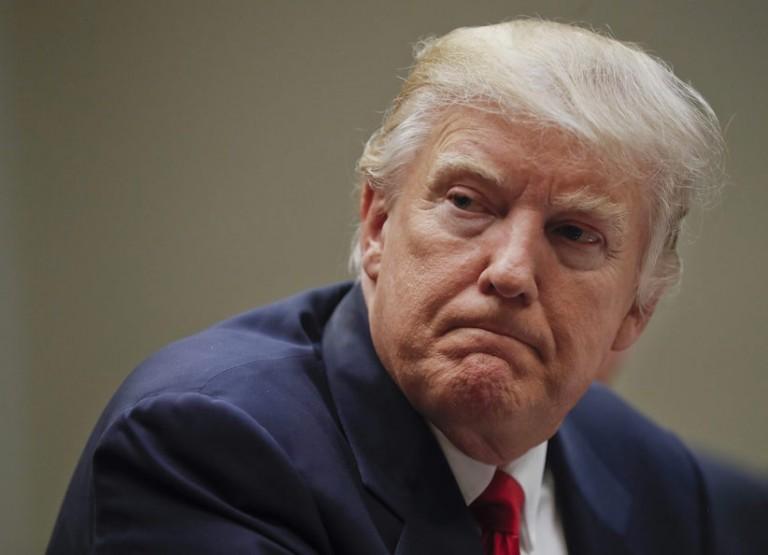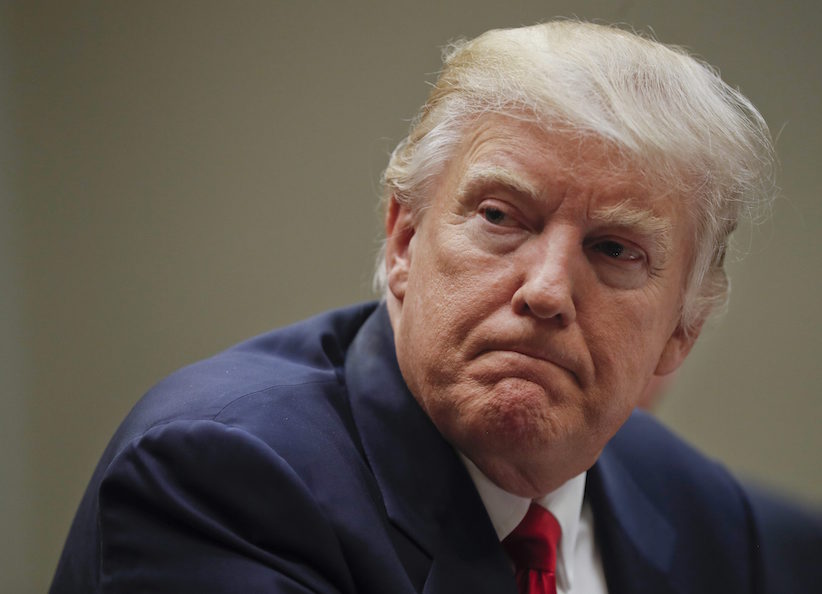Under Trump, the unbelievable is becoming reality
So much of what is happening in the U.S. right now makes no sense, and now the American chaos and confusion is heading north

President Donald Trump meets with health insurance company CEOs, Monday, Feb. 27, 2017, in the Roosevelt Room of the White House in Washington. (AP Photo/Pablo Martinez Monsivais)
Share

With several key officials in U.S. president Donald Trump’s entourage under investigation owing to their clandestine associations with Vladimir Putin’s Kremlin, and with Trump having declared in an outlandish weekend Twitter frenzy that former president Barack Obama himself wiretapped the Trump Tower, there’s one thing that can be said with some certainty: In the United States right now, what would otherwise be utterly unbelievable is actually happening, in real time, before our very eyes.
It doesn’t help that there is a kind of a war going on between the Trump administration and the American news media. Hostilities broke out into the open last month when Trump declared several major American news organizations to be “the enemy of the American people.” A poll by the Investors Business Daily and TechnoMetrica Market Intelligence released Monday shows that roughly half of Americans believe that the news media “has assumed the role of the opposition party.” As if that were a bad thing, or in any case avoidable.
Making things even more difficult to sort out, there is also a fierce background battle underway between the White House and the U.S. intelligence community. For some months now, America’s counter-intelligence specialists engaged in investigations of Russian meddling in the U.S. presidential election campaign have been confounded by Trump officials reportedly showing up in wiretaps authorized by the Foreign Intelligence Surveillance Court.
In the midst of all this, Trump has been trying to salvage what he can from his sordid campaign pledge to at least temporarily “ban Muslims” from entering the United States. Trump’s Jan. 27 executive order slammed America’s doors shut on all refugees, and on visitors (visa-holders included) from seven Muslim-majority countries, throwing the U.S. customs and immigration system into chaos. The order was suspended by the courts, but the White House retrenched, and on Monday Trump signed a new order.
The new executive order retains most of the features of the old one, except that Silicon Valley got cut significant slack in the order’s exemption of existing visa holders. Otherwise, chaos reigns again, and a new clutch of legal challenges is in the offing. Canada, particularly, with its deep and intricate economic ties and a mostly unguarded 8,891-km border with the United States, is again stuck with the work of discerning the unbelievable but true from the perfectly believable but not necessarily true.
Khizr Khan, the Pakistani-American “gold star” father who famously upbraided Trump during a stirring speech to the Democratic National Convention last July, was supposed to give a lecture in Toronto this week. But on Monday, Khan and the lecture’s organizers released statements cancelling the event, explaining that Khan had been informed by American authorities that his “travel privileges” were being reviewed.
Given everything going on in the United States just now, this seemed believable, but it still made absolutely no sense. There’s no such thing as “travel privileges” for American citizens—travel to and from the United States is a right—and no further explanation was available from Khan, an American citizen of 31 years standing, or from the Ramsay Talks organization, which was sponsoring his lecture. Calls by various reporters to the U.S. Customs and Border Protection agencies, and the Transportation Security Administration, and the Canada Border Services Agency, turned up nothing by way of a possible explanation.
In the House of Commons on Monday, NDP leader Thomas Mulcair, who has called Trump a fascist, was once again on Prime Minister Justin Trudeau’s case for not being louder in his conversations with the White House. Mulcair specifically raised the case of Manpreet Kooner of Montreal, a passport-carrying Canadian citizen who was headed to a spa in Vermont when she was unaccountably turned away after a six-hour ordeal at the border over the weekend, which may or may not have anything to do with anything.
Born in Canada to Indian parents, Kooner, who had run into trouble at the border owing to some U.S. Customs computer glitch last December, was advised to obtain a visa if she wanted to enter the United States again. This made no sense, but Kooner travelled to the U.S. embassy in Ottawa on Monday to apply for a visa anyway, only to be told what everyone already knows: that Canadians need only a passport, and not a visa, to visit the United States.
Whatever explains any of this, Trump’s apparent paranoia about Muslims would possibly explain the case of several Muslim-Canadians who were turned away from the border in several separate and otherwise inexplicable cases last month. In each of those cases, however, over-anxious and paranoid border security officials exercising their discretion arbitrarily and incompetently would also explain things.
It is perfectly believable, meanwhile, that the spike in northbound traffic of border-crossers at remote locations—most prominently in the snowy frontier just south of Emerson, Man.—is the result of dispirited Muslim refugees fleeing to Canada from an increasingly unwelcoming American milieu.
That’s the way the story has tended to be told, and there’s apparently some truth to it, but it turns out that things are not quite as clear as they seem. “The vast majority of people who are presenting themselves at the border are actually transiting through the United States,” Public Safety Minister Ralph Goodale told Global News last week. “Their plan was not originally to be in the United States, but to come through the United States” to Canada.
Some of the would-be refugee claimants have been presenting awaiting Mounties at the border with U.S. transit visas obtained at the U.S. embassy in Riyadh, Saudi Arabia, and the most noticeable upsurge in northbound refugee-claimant traffic did not coincide with the election of Donald Trump, after all, but rather with the election of Justin Trudeau.
The Immigration Refugee Board reports a 40 per cent hike in “inland” refugee claims following the election of Trudeau’s Liberal government in November, 2015, part of a longer upward trend which rose from nearly 3,000 claims in 2013 to 7,000 by the end of last year. The federal government is nonetheless facing increasing calls to suspend the Safe Third Country Agreement with the United States, which disallows refugee claims from people arriving in Canada at regulated border points.
A petition calling on the government to accede to the NDP’s demands and suspend the arrangement has garnered 40,000 signatures. Suspending the agreement would fix the problem of “irregular” border crossings, all right. But it would just as likely encourage far greater numbers of refugee-status hopefuls to set out from North Africa and make their way through Latin America and the United States, as they have been doing for quite a while now, only to present themselves at regulated Canada-U.S. border crossings.
Opposing the petitioners is a weird school of thought that the RCMP should simply stop refugee claimants from crossing the border and filing their claims. This would be illegal under international law and Canadian law. Still, unbelievably but truly, this hasn’t stopped Conservative leadership candidate Kellie Leitch: “When it comes to the irregular border crossings, I have been clear. They should be detained, questioned and sent back immediately.”
And so the American chaos and confusion is heading north, and what would otherwise be unbelievable is actually happening in Canada, too.